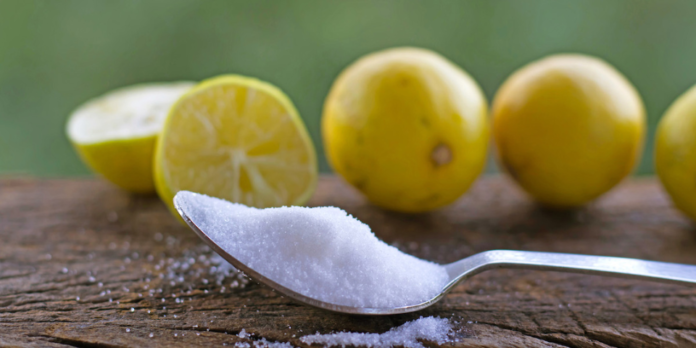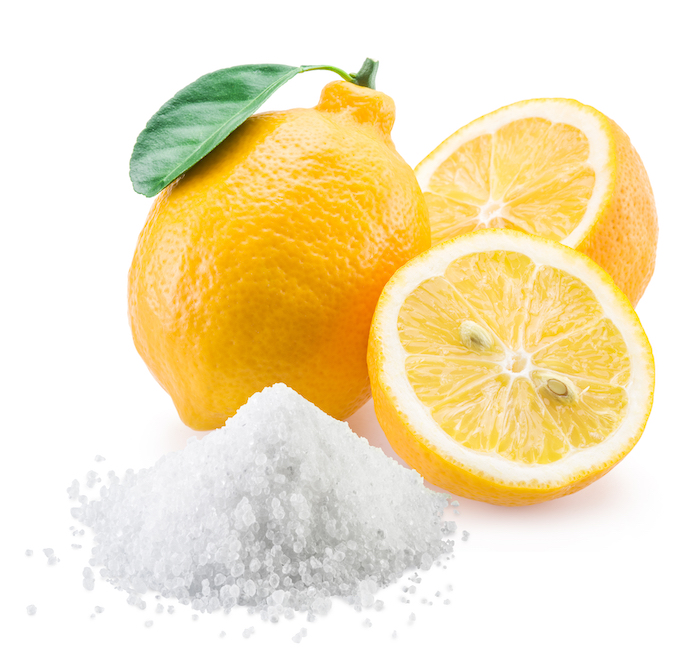[ad_1]
Skim the ingredient checklist of many drinks, jams, canned greens, or frozen meals and also you’re more likely to come throughout one which you can truly pronounce — citric acid.
Regardless of its prevalence, few shoppers know what it’s or the place it comes from. (Although that first phrase ought to provide you with a clue…)
Right here’s what it is best to learn about citric acid, together with its origins, makes use of, and advantages.
What Is Citric Acid?
Citric acid is an edible acid naturally present in citrus fruits, and it’s what gives them their sour taste.
It’s additionally commercially manufactured for all kinds of makes use of in processed meals and drinks, cleansing merchandise, prescribed drugs, dietary dietary supplements, and cosmetics.
Whereas lemons and limes could also be extra generally identified for his or her ascorbic acid (AKA vitamin C) content material, citrus fruits truly include extra citric acid. In truth, citric acid can account for as a lot as 8 percent of the full dry mass of a lime or lemon!
The preliminary discovery of citric acid is credited to eighth-century Persian alchemist Jabir Ibn Hayyan. But it surely wasn’t till the late 1700s when Swedish chemist Carl Wilhelm Scheele first remoted citric acid from lemon juice.
Over the subsequent century, citric acid grew to become extensively utilized in a wide range of meals, cleansing, and beauty merchandise as a preservative, flavor-enhancer, and stabilizer.
Within the 1900s, American meals chemist James Currie discovered {that a} frequent fungus that causes black mildew on vegatables and fruits, Aspergillus niger, produces massive quantities of citric acid when fed a sugar resolution.
This artificial technique of deriving citric acid revolutionized the market and have become the brand new customary for its industrial manufacturing.
Citric Acid Makes use of in Meals
“It’s utilized in meals and drinks to spice up acidity, improve taste, and protect substances,” explains Amy Goodson, MS, RD, CSSD, LD, a board-certified specialist in sports activities dietetics. “It can be added to canned fruits and vegetables to guard towards botulism, a uncommon however critical sickness attributable to micro organism.”
Citric acid is without doubt one of the commonest meals components on the planet due to the number of uses and benefits it affords, Goodson provides.
Listed below are just some citric acid’s functions:
Citric Acid Advantages
Whereas citric acid affords a variety of advantages for meals and beverage producers, Goodson explains that dietary citric acid may also present a lot of well being advantages for shoppers as effectively.
1. Antioxidant properties
Some analysis has proven that citric acid could profit antioxidant exercise.
Antioxidants are substances present in meals like vegatables and fruits which will forestall or delay sure varieties oxidative stress that may trigger cell injury. Citric acid is associated with antioxidant benefits for serving to to assist the immune system in addition to liver and mind operate.
2. Mineral absorption
Citric acid can assist your physique retain some key minerals. “Citric acid enhances the bioavailability of sure minerals, serving to your physique to raised take in them,” explains Goodson.
Research have supported a hyperlink between citric acid and mineral absorption, calcium and phosphorus, particularly.
3. Cut back bodily fatigue
Whereas extra analysis is required to grasp its connection to bodily fatigue, citric acid may profit power ranges.
A small human study reported within the Journal of Scientific Biochemistry and Diet discovered that oral consumption of citric acid helped scale back physiological stress and fatigue within the physique after exhausting exercises.
Whereas the explanations for this phenomenon aren’t fully understood, it’s theorized that it could have one thing to do with the cycle of power manufacturing wherein citric acid is a major participant.
Is Citric Acid Unhealthy for You?
Involved that citric acid is likely to be dangerous for you?
Whereas 99 % of the world’s manufacturing of citric acid is now manufactured as a substitute of derived from lemons, there may be little proof that citric acid — even the artificial stuff — has well being dangers for shoppers, says Goodson.
“Manufactured citric acid is generally recognized as safe (GRAS) by the Meals and Drug Administration (FDA). So shoppers can really feel protected consuming it as part of meals and drinks,” Goodson explains.
[ad_2]
Source link










